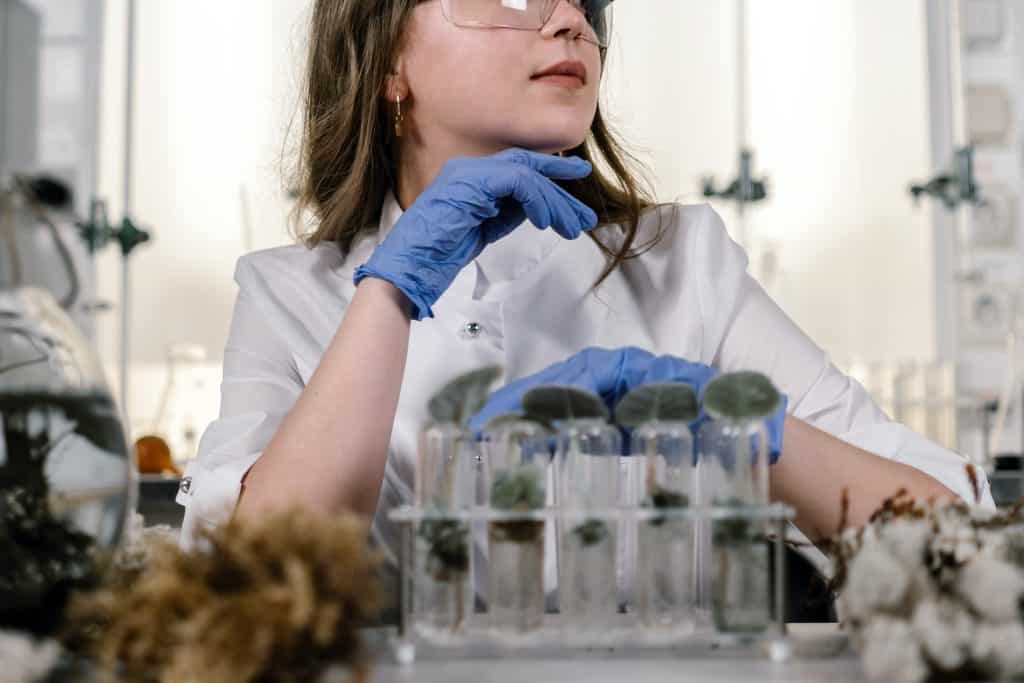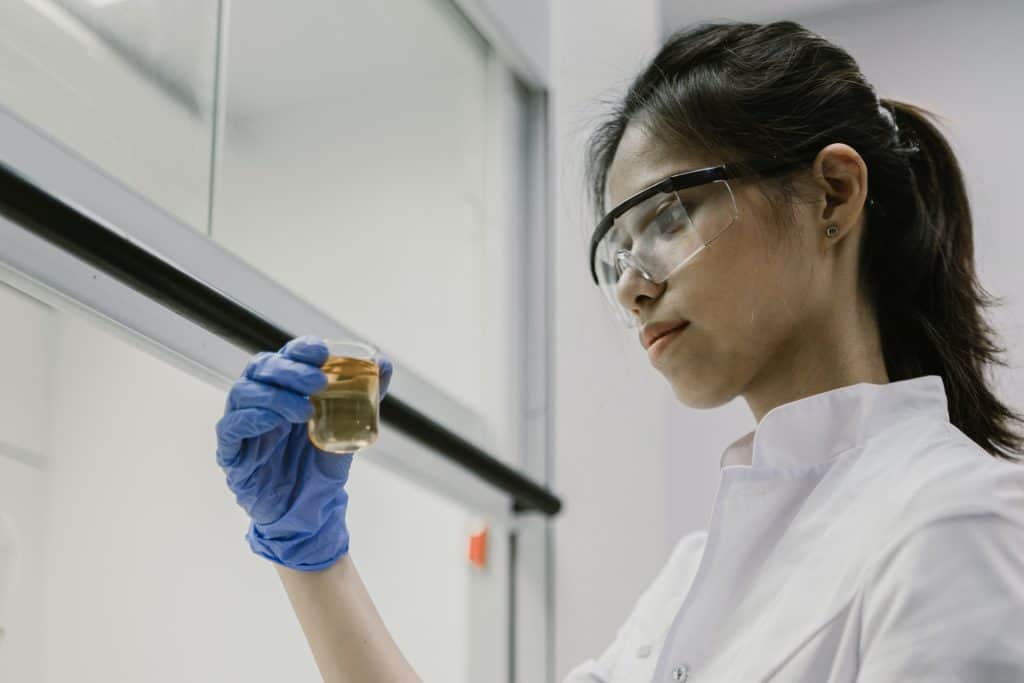It’s no secret that the world of work is changing. With contemporary biomedical technology, there are new opportunities for those willing to learn new skills and adapt to new ways of working. If learners want to stay ahead of the game, then learning about jobs for biotechnology masters may be the right move.
Biotechnology is an exciting and rapidly growing field that offers many opportunities for those willing to learn. The good news is that students can get a quality online master in biotechnology without having to leave their homes. Thanks to advancements in online learning, students can now earn their degrees or certificate from some of the best schools in the country without ever setting foot on campus.

What is Biotechnology?
Before a degree seeker wonders “what can I do with a masters in biotechnology,” let’s find out what exactly biotechnology is. Biotechnology is the application of scientific and engineering principles to the processing of materials by biological agents to create or modify products or processes for specific use. It covers a wide range of techniques, including genetic engineering, cell culture, biochemistry, and fermentation.
- Genetic engineering is perhaps the best-known form of biotechnology. It involves modifying the genes of an organism to change its characteristics. This can be done for a variety of purposes, including making crops more resistant to pests and diseases, improving the nutritional value of food, and creating new pharmaceuticals.
- Cell culture is another common biotechnology technique. It involves growing cells in a controlled environment outside of their natural body. This can be used to create new tissue for transplantation, produce vaccines, and test the effects of new drugs.
- Biochemistry is the study of the chemical processes that occur in living organisms. It is used in a variety of biotechnology applications, including the production of pharmaceuticals, the development of diagnostic tests, and the generation of biofuels.
- Fermentation is a biotechnology process that uses microorganisms to convert carbohydrates into alcohol or organic acids. It is used in the production of beer, wine, and bread, as well as in the manufacture of some drugs and chemicals.
Is Masters in Biotechnology Worth It?
Earning a master’s degree in biotechnology can open the door to a variety of exciting and rewarding career opportunities. If someone wants to work in this field, then a master’s degree is often seen as the minimum requirement.
Most employers of masters of biotechnology jobs will also require candidates to have experience working in a laboratory. This can be gained through an internship or a research assistant position.
The jobs for biotechnology masters professionals are expected to grow at a rate of 7% before 2030, according to the US Bureau of Labor Statistics. This is faster than the average growth rate for all occupations.
As the field of biotechnology continues to grow, so too will the demand for qualified professionals. If students want to stay ahead of the curve, then earning an online biotechnology masters is a great way to do it.
Why Should I Get My Biotechnology Master’s Degree Online?
Online learning has revolutionized the field of education. It has made it possible for anyone, anywhere in the world, to get a quality education without ever having to leave their home.
There are many reasons why someone might want to consider getting an online biotechnology masters. Here are just a few:
- Have the flexibility to study when and where it’s convenient. Since learners won’t be tied to a physical classroom, they’ll be able to study around work and family commitments.
- Save money on tuition, room and board, and travel costs. During an online program, participants only need to pay for the cost of their education and nothing more.
- Have access to a wider range of programs and courses. When students study online, they’re not limited to the programs offered by local colleges and universities. Students can choose from any accredited online school in the world.
- Learn at one’s own pace. If learners want to take a faster or slower approach to studies, online learning lets them do that.
- Get real-world experience. Many online programs offer internship and research opportunities that can give degree seekers the hands-on experience to succeed in masters in biotechnology jobs.
Types of Degrees and Specializations in Biotechnology
When someone pursues a biotechnology master’s degree, they’ll have the opportunity to choose from a variety of different degree types and specializations. Here are some of the most popular options:
- Master of Science (MS) in Biotechnology: This is the most common type of biotechnology master’s degree. It usually takes two years to complete and often includes a thesis component. In this type of program, students take courses in topics like cell and molecular biology, biochemistry, and microbiology.
- Master of Arts (MA) in Biotechnology: This type of degree is less common than an MS but is still available at some schools. It typically takes two years to complete and may or may not require a thesis. The coursework for an MA in biotechnology is similar to that of an MS program.
- Master of Biotechnology: This is another degree option that is less common than an MS or MA. It usually takes two years to complete and often has a more interdisciplinary focus than other types of programs. In addition to taking courses in biology and chemistry, students in this type of program might also take classes in business, law, and ethics.
- Ph.D. in Biotechnology: This is the highest level of degree available in this field. It usually takes four to six years to complete and includes a dissertation. In a Ph.D. program, students take courses in advanced topics like genetic engineering, immunology, and protein structure.
There are many different types of biotechnology degrees and specializations available, so students should research programs carefully to find the one that best meets their needs.
What Will I Learn in a Biotechnology Master’s Program?
The coursework for a masters in biotechnology online program will vary depending on the type of degree and specialization chosen. The course offerings in biotechnology programs will always build on your undergraduate degree and include things like life sciences, practical skills, and health sciences.
\However, some common courses are typically included in these programs.
1. Introduction to Biotechnology
This course provides an overview of the field of biotechnology. Students learn about the history of biotechnology and its current applications in areas such as agriculture, pharmaceuticals, and environmental engineering.
During the course, students also gain an understanding of the ethical considerations associated with biotechnology. Since biotechnology is constantly evolving, this course is a good introduction to the many areas of specialization within the field.
2. Biochemistry
This course explores the fundamental principles of biochemistry. Students learn about the structure and function of biomolecules such as proteins, carbohydrates, and DNA. They also learn about key biochemical processes such as protein synthesis and photosynthesis.
This course is important for students who want to work in the pharmaceutical or agricultural industries, as a strong understanding of biochemistry is essential for developing new drugs and genetically modified crops.
3. Molecular Biology
In this course, students learn about the structure and function of genes at the molecular level. They also study how DNA is transcribed into RNA and how RNA is translated into protein.
Other topics covered in this course include genetic mutations, gene regulation, and DNA replication. This course is essential for students who want to pursue masters degree biotechnology jobs in research or pharmaceuticals.
4. Cell Biology
This course covers the structure and function of cells, the basic units of life. Students learn about cell organelles, cell division, and cell signaling.
They also study the different types of cells in the body, such as muscle cells, nerve cells, and blood cells. This course is important for students who want to work in the medical field, as a strong understanding of cell biology is essential for diagnosing and treating diseases.
5. Immunology
This course covers the body’s immune system, which protects against infection and disease. Students learn about the different types of immunity, such as innate immunity and acquired immunity.
While taking this course, students also gain an understanding of how the immune system works to protect the body from harmful microbes. This course is important for students who want to work in the medical field, as a strong understanding of immunology is essential for diagnosing and treating diseases.
6. Microbiology
As the name suggests, this course covers the study of microbes. Students learn about the different types of microbes, such as bacteria, viruses, and fungi.
They also study the role of microbes in human health and disease. This course is important for students who want to work in the medical field, as a strong understanding of microbiology is essential for diagnosing and treating infections.
7. Bioinformatics
From its name, one might guess that this course covers the use of computers in biotechnology. In this course, students learn about software programs and databases used to store and analyze biological data. They also learn how to use these tools to solve real-world problems in biotechnology.
This course is important for students who want to work in the pharmaceutical or agricultural industries, as a strong understanding of bioinformatics is essential for developing new drugs and genetically modified crops.
8. Biomedical Engineering
Even when not planning on becoming an engineer, this course is still worth taking. In this course, students learn about the use of engineering principles to solve problems in biology and medicine. They also understand how to design and build medical devices and prosthetics.
Consider taking this course if interested in working in the medical field, as a strong understanding of biomedical engineering is essential for developing new treatments and therapies.
These courses provide a solid foundation for career advancement in drug development, agricultural biotechnology, and other parts of the biotech industry.
Biotech Careers and Salary
With a degree in biotechnology, learners prepare for a career in the pharmaceutical or agricultural industries or in research.
Here are some examples of potential careers in biotechnology:
1. Research Scientist
A research scientist uses the knowledge of biochemistry and molecular biology to conduct experiments and develop new drugs and treatments. There’s a lot of room for creativity and innovation in this career, as research scientists are always looking for new ways to solve problems. One can expect to earn a median salary of $62,333 per year in this role.
2. Pharmaceutical Sales Representative
A pharmaceutical sales representative is responsible for promoting and selling drugs and other medical products to doctors and other healthcare professionals. This career requires strong communication and interpersonal skills, as well as a deep knowledge of the products they’re selling. The median salary for this role is $72,000 per year.
3. Agricultural Scientist
Agricultural scientists use their knowledge of biochemistry and plant science to develop new ways to grow crops and improve crop yields. This career is important for feeding the world’s growing population. The median masters in biotechnology salary for this role is $73,938 per year.
4. Biomedical Engineer
When considering engineering, prospective students probably don’t think of biology. But biomedical engineers use their knowledge of both disciplines to develop new medical treatments and therapies. This career is important for improving the quality of life for people with chronic illnesses. Their median biotechnology masters salary is $61,000 per year.
5. Biochemist
A biochemist is a scientist who uses their knowledge of chemistry and biology to conduct experiments and develop new products. This career is important for developing new drugs and treatments, as well as for improving the quality of food. The median salary for this role is $71,000 per year.
The field of Biotech can provide a solid income – even more with a few years of experience under your belt. Don’t just take our word on it – the proof is in the numbers. According to Payscale the average Biotechnology position pays on average $82k a year.
| Job Title | Range | Average |
|---|---|---|
| Research Scientist | $56k – $122k | $86,373 |
| Research Scientist, Biotechnology | $62k – $123k | $93,239 |
| Research Associate, Biotechnology | $46k – $79k | $62,436 |
| Senior Research Scientist, Biotechnology | $80k – $143k | $110,828 |
| Senior Research Associate | $60k – $101k | $79,225 |
| Associate Research Scientist | $50k – $92k | $69,352 |
| Principal Scientist | $96k – $157k | $129,653 |
Do I Need a Master’s Degree in Biotechnology?
One might wonder if a master’s degree in biotechnology is necessary. The answer depends on their goals.
For those who want to work in the pharmaceutical or agricultural industries or research, a master’s degree is usually required. But to work in sales or marketing or in a government position, a bachelor’s degree may be sufficient.
The bottom line is that a master’s degree in biotechnology hones the skills and knowledge needed for a successful career. And if students aren’t sure what they want to do with their degree, a master’s degree will give them the time and flexibility to explore different options.
What Can I Do with a Master’s Degree in Biotechnology?
A career in biotechnology can be extremely rewarding, both personally and professionally. With masters in biotechnology online degrees, graduates have the opportunity to make a real difference in the world by developing new technologies and therapies to improve the quality of life for people all over the globe.
Some students wonder, “What jobs can you get with a masters in biotechnology?” There are many different career paths that graduates can take with a master’s degree in biotechnology. Some of the most popular career options include:
- Research and development: One of the most common career paths for graduates with a master’s degree in biotechnology is research and development. Students need to know biology and chemistry to develop new products and technologies.
- Quality control: Another popular career option for graduates with an online masters in biotechnology is quality control. In this role, professionals are responsible for ensuring that all products and technologies developed by their company meet the highest standards of quality.
- Sales and marketing: If they’re interested in working in the business side of the biotechnology industry, they may want to consider a career in sales and marketing. Students can promote and sell the company’s products and technologies.
- Regulatory affairs: If they want to work with government agencies, these students may want to consider a career in regulatory affairs. In this role, students are responsible for ensuring that all products and technologies developed by the company meet all government regulations.
- Project management: To manage projects, students may want to consider a career in project management. They’ll be overseeing the development of new products and technologies from start to finish.
Choosing the Best Program for Me
When it comes to choosing a master’s program in biotechnology, there are a few things to keep in mind.
- Make sure the program is accredited.
- Make sure the program offers financial aid and scholarships.
- Choose the right program.
- Make sure the program has a good reputation.
- Ask around for recommendations.
Admissions
To be admitted into an online masters in biotechnology, students need a bachelor’s degree in a related field. Then, they can submit the following information to apply:
- transcripts
- GRE scores
- letters of recommendation
- personal statement
The admissions process for a master’s in biotechnology can be competitive, so it’s important to have strong grades and test scores. If unsure what program to pick, students can speak with an admissions counselor, who can help them choose the right program and provide tips on how to improve their application.
Accreditation
Choosing an accredited program for an online biotechnology master’s degree validates their degree to employers and other institutions. There are a few degree accreditation bodies, but the most common and recommended way is through the Distance Education Accrediting Commission (DEAC).
- The DEAC is a US-based accrediting agency that is recognized by the US Department of Education and the Council for Higher Education Accreditation (CHEA)
- Another way to gain accreditation for an online biotechnology master’s degree is through the Association of Accredited Naturopathic Medical Colleges (AANMC). The AANMC is a US-based organization that provides accreditation for naturopathic medical programs.
- The National Board of Natural Medicine (NBNM) is another US-based organization that provides accreditation for naturopathic medical programs.
Financial Aid and Scholarships
Most online programs offer some form of financial aid and scholarships for those who qualify. The best way to find out if they qualify is to contact the admissions office at the school they are interested in attending. Often, there is a separate office that handles financial aid and scholarships, and they will be able to tell applicants what’s needed to apply.
In general, students will need to fill out a Free Application for Federal Student Aid (FAFSA) to be considered for financial aid. Parents may also be required to fill out the Parent PLUS Loan Application to be considered for a PLUS loan.
There are also many private scholarships available, and degree seekers can find information about them on the websites of the schools they are interested in attending. Additionally, several national databases list scholarships, such as FastWeb and Scholarships.com.
Certifications and Licensure in Biotechnology
For those seeking to enter the field of biotechnology, there are a few different types of certifications and licensures available. The most common type of certification for entry-level positions is the Certified Laboratory Technician (CLT) credential, which can be obtained through the American Society for Clinical Laboratory Science (ASCLS).
- In working in research and development, the American Board of Bioanalysis (ABB) offers the Certified Molecular Biology Technician (CMBT) credential.
- In management positions, the American Institute of Biological Engineers (AIBE) offers the Certified Biological Engineer (CBE) credential.
- In teaching at the collegiate level, the National Association of Biology Teachers (NABT) offers the Certified Biology Teacher (CBT) credential.
While not required, these certifications can help demonstrate one’s knowledge and commitment to the field of biotechnology and may give an individual a competitive edge when applying for biotechnology masters jobs.
In addition, some states require licensure for certain positions in the field, such as clinical laboratory technologists. Individuals interested in pursuing licensure should check with their state’s licensing board to determine the requirements.
Online Biotechnology Master’s Programs
College Consensus features only accredited, reputable institutions. The programs below are presented in alphabetical order with no ranking implied.
1. American University

American University offers an MS in Biotechnology Professional Science as an interdisciplinary program involving the College of Arts and Sciences and Kogod School of Business. Prospective students benefit from courses designed to prepare them for leadership roles in biotechnology. The curriculum immerses students in science, health care, research, policy, and entrepreneurship studies. There are four tracks to choose from, including drug discovery, biodefense, biotechnology management, and bioinformatics.
Degree: MS in Biotechnology
2. Johns Hopkins University

Johns Hopkins University has a masters in biotechnology that brings concepts to life. It bridges numerous industries, including energy, agriculture, pharmaceuticals, national security, and research and development. Graduates go on to careers in manufacturing, sales, product development, finance, and law. Students can choose from numerous concentrations and electives that allow them to tailor their education to their career goals.
Degree: MS in Biotechnology
3. Morehouse School of Medicine

Morehouse has a Master of Science in Biotechnology degree. In this program, students master the fundamentals of both the business and scientific components needed to understand biotechnology. In 35 credit hours, students complete their degree on average in 12 months. The program gives students the flexibility to pursue careers in biotechnology practice and leadership.
Degree: MS in Biotechnology
4. Mount St Mary’s University

The Master of Science in biotechnology and management program at St Mount St. Mary’s falls under the natural science and mathematics department. It uniquely equips graduates to solve humanity’s complex problems through strong research and development and scientific thinking.
Degree: MS in Biotechnology and Management
5. Northeastern University

Northeastern has an MS in Biotechnology that doesn’t require students to produce a thesis. Instead, the curriculum is full of courses needed to train tomorrow’s biotechnologists. Courses include chemistry, chemical engineering, biology, and pharmaceuticals. There’s also a strong emphasis on business skills, which are currently lacking in some parts of the industry. Successful graduates will go on to fulfill roles as managers, collaborators, and leaders. The program is taught by senior leaders in various fields and includes rigorous projects and coursework.
Degree: MS in Biotechnology
6. Rutgers University

The MBS Biotechnology & Genomics concentration gives students the tools they need to successfully lead the development of technology. Students also study commercial applications of scientific discoveries in genomics, biochemistry, biology, and nanotechnology. There’s a demand for these fundamentals and numerous fields, including alternative energy, pharmaceutical development, healthcare, and nanotechnology, to name just a few. Learners also master fundamental business skills such as entrepreneurship, finance, accounting, management, ethics, intellectual property law, and regulatory law.
Degree: Master of Business and Science in Biotechnology and Genomics
7. Texas Woman’s University

Texas Women’s University has a Professional Science Master’s in Biotechnology. Students typically complete the degree in 12 months when enrolled full time. It’s one of only two universities in Texas offering biotechnology degrees. Flexible online courses make it possible for working professionals to complete their education. Students have access to technical training in advanced laboratories.
Degree: MS in Biotechnology
8. University of Maryland Global Campus

This degree specializes in biotechnology management. University of Maryland Global Campus students complete their degrees online and build skill sets in biology and business. Graduates are sought after professionals who sometimes launch and manage biotechnology ventures. The Council of Graduate Schools recognizes the program as a Professional Science Master’s degree.
Degree: MS in Biotechnology
9. University of Wisconsin Madison

Some students choose the University of Wisconsin–Madison campus for its MS in applied biotechnology. The program helps students gain leadership positions by giving them the requisite skills and knowledge. Courses include product development, communication, ethics, leadership, regulatory and compliance practices, and so much more. This versatile program offers three tracks for students including business management, research and development, and quality assurance and compliance.
Degree: MS in Applied Biotechnology
10. Worcester Polytechnic Institute

WPI has a hybrid online MS degree in Biotechnology. Students do not have to complete a thesis and can complete much of their work online. However, there is also a lab training requirement that gives students hands-on access to professors who are leaders in the field. Some working professionals prefer this program for its part-time option.
Degree: MS in Biotechnology
Professional Organizations in Biotechnology
As in other fields, professional organizations in biotechnology often include options for students to join. This is a great way for students and graduates to network, look for employment opportunities, and expand their knowledge of the field.
Examples of professional organizations in biotechnology include:
- Biotechnology Innovation Organization
- Biomedical Engineering Society
- Institute of Biological Engineering
- American Institute of Chemical Engineers
- American Institute for Medical and Biological Engineering
- Society for Biological Engineering
- American Society for Cell Biology
- American Society of Human Genetics
- Society for Industrial Microbiology and Biotechnology
Related:
